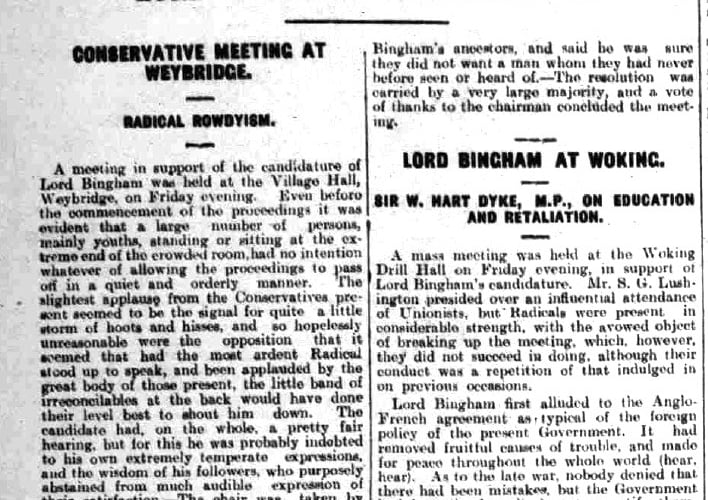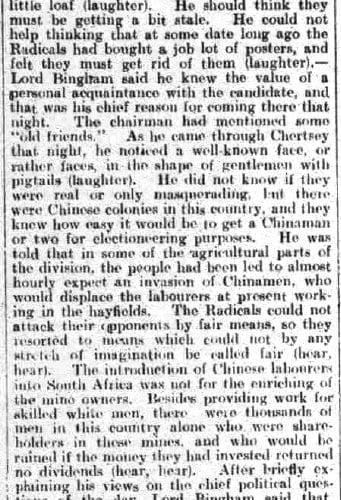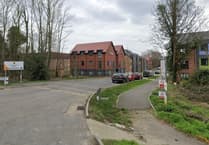


VILLAGERS in Chobham went to the polls four times in the early 1900s in elections for their MP.
Continuing to look at elections past, this week’s page is triggered by a picture postcard showing an early motorcar with a sign on it that reads “VOTE BINGHAM”.
The car is pictured in front of the then Chobham Schools, off Bagshot Road, and is dated by the caption that reads “Election day, July 6th, 1904”. Presumably the school was used as a polling station.
At that time Chobham was within the Chertsey parliamentary division and voters had been to the polls as recently as the general election of 26 September 1900, when Conservative candidate Henry Leigh-Bennett retained his seat against the Liberal candidate Hubert Longmam.
However, Leigh-Bennett died in 1903 and a by-election was held on 26 March 1903, with Conservative John Arthur Fyler being elected, but he didn’t stay long.
Fyler lived at Windlesham and in 1898 he became the Conservatives’ agent for the Chertsey parliamentary division. He was said to have been a keen sportsman, a freemason and was a lawyer by profession.
However, Fyler was made bankrupt in May 1904, with liabilities of £22,279, and stepped down as Chertsey’s MP. It is recorded his financial deficiency was partly explained by Stock Exchange losses of £14,000, betting losses of £1,000, interest on borrowed money of £3,404, and expenses for his parliamentary election at £1,043.
Therefore another by-election was called for 6 July 1904 and Lord George Bingham stood as the Conservative candidate. He was the fifth Earl of Lucan, and had served in the Rifle Brigade, retiring with the rank of captain in 1896.
Then, in 1900, he joined the 1st London Rifle Volunteers (Territorial Army) as a major, and later as colonel. He served in the First World War, and gained the rank of Honorary Brigadier-General in 1917 and retired as a lieutenant-colonel in 1923.
He had been appointed High Sheriff of Mayo in 1902-03. Later, in 1934, he was created Baron Bingham, of Melcombe Bingham, in the County of Dorset, into the peerage of the UK. The Bingham’s family home had been at Laleham, Surrey, since 1803, but Bingham sold it in 1922.
Lord Bingham’s opponent in the 1904 by-election was Thomas Sadler, standing for the Liberal Party. The local press reported in detail several rallies Lord Bingham attended ahead of the by-election. These were at West End, Woking, Horsell, Ash, Weybridge and Chertsey.
In these reports the press referred to the popular names for the Conservatives as Unionists and the Liberals as Radicals. It seems the topics of discussion at these rallies were not so much local issues but national ones and foreign policy too.
Liberal candidate Thomas Sadler was critical of the Conservative government, claiming it had lost public confidence due to domestic and international issues. He believed the 1902 Education Act violated the principle of public control over expenditure.
Lord Bingham, on the other hand, endorsed Conservative Prime Minister Arthur Balfour’s fiscal policy and advocated for what was called the Chinese Ordinance as a solution for the Transvaal’s development challenges. This was about more than 60,000 Chinese labourers who worked and lived in poor conditions in the Witwatersrand gold mines in South Africa between 1904 and 1910.
Lord Bingham won the by-election by 549 votes, but he did not represent his constituents long as there was another general election on 27 January 1906, when the Liberals, led by Henry Campbell-Bannerman, won a landslide majority at the election.
Even Lord Bingham lost his seat, the only Conservative ever to lose the Chertsey division seat. He was swept aside by the Liberal Party’s Frank Marnham. Yet Marnham only served one term, asking parliamentary questions about the exemption of sheepdogs from the dog licence and the number of road signs in each county council denoting danger to pioneering motorists. Surrey had 420.
Thanks go to Mark Coxhead for the picture postcard and some details that led to this week’s story.

.jpeg?width=209&height=140&crop=209:145,smart&quality=75)


Comments
This article has no comments yet. Be the first to leave a comment.